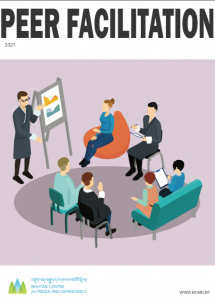March eNews 2021
Remaining ‘Apolitical’ in Bhutan’s Democracy
Bhutan’s democracy isn’t about political parties or elections alone; it is an everyday exercise and it is only as strong as the participation of its citizens. However, having to remain ‘apolitical’ is often a barrier in deepening and expanding the discourses on Bhutan’s democracy.
Therefore, BCMD in partnership with the Royal University of Bhutan hosted the Bhutan Democracy Forum on “Being Apolitical in Democratic Bhutan.” Gathering an esteemed panel of national and international speakers moderated by Dasho Kinley Dorji, the 2-hour discussion saw the panel breakdown the topic of ‘apoliticalness’, its connotations and the misunderstanding surrounding it.
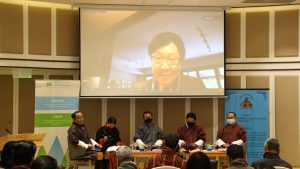
In talking about civil servants being apolitical, Dasho Karma Tshiteem shared that policies and politics cannot be separated. Their political stance is important to ensure that in designing and implementing policies, they bring on board the full benefit of their past experiences and their professional expertise and not be influenced or coloured by their political preferences.
The forum was attended in-person by the national assembly speakers, parliamentarians, representatives from the government agencies, political parties, press and more whereas 238 university lecturers and students and other individuals from within and outside the country joined the forum via Zoom.
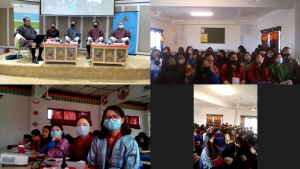
The forum will be aired on BBS and will also be uploaded on BCMD’s YouTube channel. The proceedings of the forum will also be printed and distributed to stakeholders.
The Bhutan Democracy Forum was supported by the Danish Institute of Parties and Democracy.
Photography Basics and Beyond
The Basic Photography Training encouraged the participants to share their diverse perspectives on the COVID-19 pandemic through photography. Over the course of 5 days, 13 participants learnt about the fundamentals of photography, visual storytelling and photography ethics.
The participants were able to capture in photographs their reflections and the impacts of the pandemic. It included reflections on issues such as food sufficiency, reliance on imported labours, and the importance of human and spiritual connections to get through difficult times among others. At the closing event, joined by their family and friends, showcased the participants’ photographs.
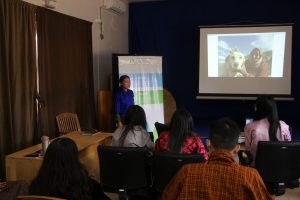
During the presentation, Tshering Selden a student from Motithang Higher Secondary School said, “I came to the photography training only expecting to learn how to take photos, however, during the training, I learnt that photography is also about telling stories.”
Jigme Choden, the principal of Motithang High School remarked that 2020 was a difficult time for schools and the youth as there were literally no youth engagement programmes. She welcomed the fact that the Media Lab is now open to the youth.
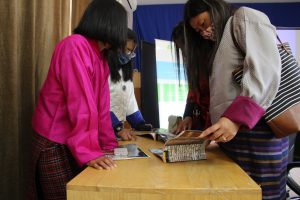
See the picture story “Moving Forward: Reflections on the COVID Pandemic”
We thank CISU for helping us fund this project.
Building Better Communities
The Building Community Initiative in 2021 is designed for our local leaders, administrators and community representatives to strengthen their capacities in the development of the gewog plans by effectively engaging the residents.
19 participants attended the three-day training on Community Mapping. It gave them a chance to relook at the definition of community and what makes it strong. The Shaba Gup shared how the lockdown helped him realise that all residents, not just the registered voters, are equal members of the community. It is important for the local elected leaders to consult and address the residents’ concerns and aspirations as much as that of the voters of their constituency.
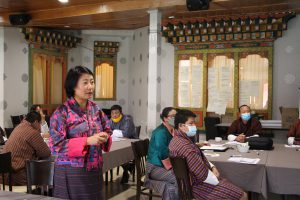
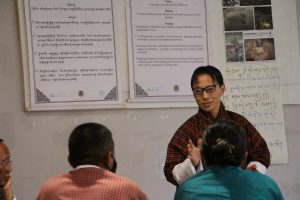
This project is supported by the Asia Foundation with the aim to strengthen inclusive and participatory planning and decision-making at the local level where elected leaders, administrators, and citizens engage in genuine consultation and democratic decision-making processes.
Making Sense of Strategic Communications
In continuation with the Civil Society Engagement Workshop conducted in September last year, BCMD developed a Strategic Communications Guidebook for Civil Society. This interactive guidebook is designed to help organisations develop a communications strategy so they can achieve their programmatic, fundraising and advocacy goals.
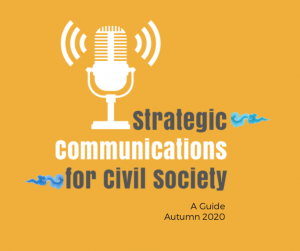
This guidebook will be distributed to civil society organisations in an effort to help expand their reach, network of supporters, partners and constituents.
This project is supported by EU Helvetas.
Dynamic Approaches Towards Learning
Designed in an intentional, graphic-driven and easy-to-understand format where each section builds on the previous one, the peer facilitation guidebook will supplement the peer facilitation training offered to help model and execute a radically different approach towards learning. The facilitative approach not only integrates the head, heart and hands when solving problems but more importantly does this in an inclusive, fun and experiential way. In the past, BCMD has utilised this approach to co-facilitate the Youth Summits which is attended by 100+ youths from across the country.
Nevertheless, the peer facilitation training remains highly flexible and lends itself to be used in a variety of settings to solve a variety of problems. This guidebook will help institutionalise the best practices so that this approach can be easily taught and replicated by other interested changemakers.
